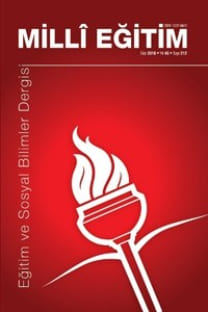ÖZEL YETENEKLİ ÖĞRENCİLERİN BİLGİSAYAR OYUNLARI DESTEKLİ KODLAMA ÖĞRENİMİNE YÖNELİK TUTUMLARI
Bu çalışmanın amacı; programlama ve algoritma mantığı ile öğrencilerin
Anahtar Kelimeler:
Özel yetenekli öğrenciler, teknoloji, kodlama, özel eğitim, tutum
___
- AKPINAR, Yavuz (2014).”Bilgi Toplumu Okullarında Programlama Eğitimi Gereksinimi”, İlköğretim Online, 13(1), 14.
- BAYRAKTAR, Şule (2000). A Meta-Analysis on The Effectiveness of Computer-Assisted Inst- ruction on Science Education, (Yayınlanmamış yüksek lisans tezi), Ohio University, U.S.
- CALDER, Nigel (2010). “Using Scratch: an Integrated Problem-solving Approach to Mathematical Thinking”, Australian Primary Mathematics Classroom (APMC), 15(4), 9-14.
- CLEMENTS, Douglas H, GULLO, Dominic F (1984). “Effects of Computer Programming on Young Children’s Cognition”, Journal of Educational Psychology, 76(6), 1051-1058.
- COŞAR, Mustafa (2013). Problem temelli öğrenme ortamında bilgisayar programlama çalışmalarının akademik başarı, eleştirel düşünme eğilimi ve bilgisayara yönelik tutuma etkileri, (Doktora tezi), Gazi Üniversitesi Eğitim Bilimleri Enstitüsü, Ankara.
- FESAKIS, Georgios, SERAFEIM, Kiriaki (2009).”Influence of the Familiarization with Scratch on Future Teachers’ Opinions and Attitudes about Programming and ICT in Education”, In proce dings of the 14th Annual ACM SIGCSE Conference on Innovation and Technology in Computer Science Education (ITiCSE-2009), pp. 258-262, Vol II, ACM, New York, NY, USA.
- HOOK, Pam. (2004). “ICT and Learning the İ-iPAinT Experience”, Computers in New Zealand Schools, Vol. 16, No. 3, 15-21.
- KALELİOĞLU, Filiz, GÜLBAHAR, Yasemin (2014). “The Effects of Teaching Programming via Scratch on Problem Solving Skills: A Discussion from Learners’ Perspective.” Informatics in Edu- cation,13(1), 33–50.
- KARASAR, Niyazi (2005). Bilimsel Araştırma Yöntemi. (14. Baskı).Nobel Yayın Dağıtım, Ankara.
- KEÇECİ, Gonca, ALAN Burcu ve ZENGİN KIRBAĞ, Fikriye (2016). “Eğitsel Bilgisayar Oyunları Destekli Kodlama Öğrenimine Yönelik Tutum Ölçeği: Geçerlilik ve Güvenirlik çalışma- sı”, Education Sciences, 11(4), 184-194.
- KELLEHER, Caitlin, PAUSCH, Randy ve KIESLER, Sara (2007).” Storytelling Alice Motivates Middle School Girls to Learn Computer Programming”, ACM, San Jose, California, USA
- KERT, Serhat Bahadır, UĞRAŞ, Tuba.(2009). “Programlama eğitiminde sadelik ve eğlence: Scratch örneği”, I. Uluslararası Eğitim Araştırmaları Kongresi, Çanakkale.
- KIM, SugHee., CHUNG, KwangSik. ve YU, HeonChang (2013). “Enhancing Digital Fluency Through aTraining Program for Creative Problem Solving Using Computer Programming”, The Journal of Creative Behavior, 47, 171-199.
- KOBSIRIPAT, Worarit (2015). “Effects of the Media to Promote the Scratch Programming Capabilities Creativity of Elementary School Students”, Procedia- Socialand Behavioral Sciences , 174, 227-2LAU, Wilfred. W. F., YUEN, Allan. H. K. (2009).”Exploring the Effects of Gender and Learning Styles on Computer Programming Performance: Implications for Programming Pedagogy”, British Journal of Educational Technology, 40(4), 696–712.
- LIAO, Yuen-Kuang Cliff, BRIGHT, George. W. (1991). “Effects of Computer Programming on Cognitive Outcomes: A metaanalysis”, Journal of Educational Computing Research, 7(3), 251- 268.
- MAZMAN, Sacide Güzin ve ALTUN, Arif (2013). “ProgramlamaI dersinin BÖTE Bölümü Öğrencilerinin Programlamaya İlişkin Öz Yeterlilik Algıları Üzerine Etkisi”, Journal of Instructional Technologies & Teacher Education, 2(3), 24-29.
- MCCLELLAN, Elizabeth. (1985). “Technology for the Gifted and Talented. 1985 Digest. ERIC Clearinghouse on Handicapped and Gifted Children Reston VA”, ERIC Number: ED262519.
- PERİATHİRUVADİ, Sita, RINN, Anne N. (2012). “Technology in Gifted Education: a Review of Best Practices and Empirical Research”, Journal of Research on Technology in Education. 45(2), 153-139.
- SHIN, Seungki, PARK, Phanwoo, BAE, Youngkwon. (2013). “The Effects of an Information-Technology Gifted Program on Friendship Using Scratch Programming Language and Clutter”, International Journal of Computer and Communication Engineering,2(3), 246.
- UYSAL, Murat Paşa (2014). “Improving First Computer Programming Experiences: The Case of Adap ting a Web-Supported and Well-Structured Problem- Solving Method to a Traditional Course”, Contemporary Educational Technology, 5(3), 198–217.
- YÜKSELTÜRK, Erman, ALTIOK, Serhat (2015). “Bilişim Teknolojileri Öğretmen Adaylarının Bilgisayar Programlama Öğretimine Yönelik Görüşleri”, Amasya Üniversitesi, Eğitim Fakültesi Dergisi, 4(1), 50-65.
- http://www.thememoryhole.org/edu/eric/ed262514.html, “Technology for the Gifted and Talented”, DIGEST, J, 11.08.2006 tarihinde erişilmiştir.
- http://jret.org/FileUpload/ks281142/File/21.karabak.pdf, “Ortaokul Birinci Sınıf Öğrencileri İçin yazılım Geliştirme Alanında Müfredat Önerisi”, KARABAK, Derya, GÜNEŞ, Ali, 15.09.2015 tarihinde erişilmiştir.
- http://www.aydin.edu.tr/belgeler/IAU-STEM-Egitimi-Turkiye-Raporu-2015.pdf, “STEM Eğitimi Türkiye Raporu”, STEM, 19.07.2016 tarihinde erişilmiştir.
- ISSN: 1302-5600
- Yayın Aralığı: Yılda 4 Sayı
- Başlangıç: 1973
- Yayıncı: Milli Eğitim Bakanlığı
Sayıdaki Diğer Makaleler
EĞİTİME YENİ BAKIŞLAR VE ALTERNATİF DÜŞÜNCELER
2018 TÜRKÇE ÖĞRETİM PROGRAMINDAKİ KAZANIMLARIN ÜST DÜZEY DÜŞÜNME BECERİLERİ BAĞLAMINDA İNCELENMESİ
12 EYLÜL 1980 ASKERİ DARBESİNİN COĞRAFYA ÖĞRETİM PROGRAMI VE DERS KİTAPLARINA YANSIMASI
2018 GÖRSEL SANATLAR ÖĞRETİM PROGRAMINDAKİ KAZANIMLARIN UYGULANABİLİRLİĞİNİN İNCELENMESİ
EĞİTİM YÖNETİCİLERİNİN YAŞADIKLARI SORUNLAR İLE SORUN ÇÖZMEDE KULLANDIKLARI TEKNİKLER
Kasım KARAKÜTÜK, Ece ÖZDOĞAN ÖZBAL
Adnan DELEN, M. Hanifi ERCOŞKUN
ÖĞRETMEN ADAYLARININ GÖZÜNDEN “ÜNİVERSİTE HOCASI
Mustafa BAŞARAN, Gül Şebnem ALTUNER ÇOBAN
ÖĞRETMENLERİN EĞİTİM DÜZEYLERİNE GÖRE SINIFLANDIRILMASINDA KARİYER UYUM YETENEKLERİNİN ROLÜ
